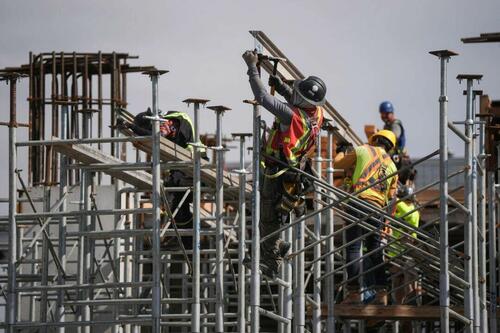Authored by Mollie Engelhart via The Epoch Times (emphasis ours),
We are living in the most materially abundant moment in all of human history, yet most of us move through life unaware of it.

We turn on a faucet and clean water appears. We flip a switch and light fills a room. With the tap of a finger, we can access the sum total of human knowledge, entertainment, and communication. We not only expect these things, we consider them normal. But none of this is normal. It is extraordinary.
Here in the United States, nearly every home has running water, electricity, paved roads, refrigeration, sewage systems, and buildings engineered to withstand storms and time. Our daily lives operate inside a lattice of infrastructure so reliable we forget it exists. We drive across bridges without a single thought for the men who hung from steel beams suspended high above rivers to construct them. We rely on power lines without remembering that someone once risked freezing temperatures or electrical burns so that power could flow uninterrupted to our homes. We flush toilets without considering the generations of engineers and laborers who built systems to prevent disease and contamination.
Civilization did not happen by accident. It was built piece by piece by millions of people, many with blistered hands, injured bodies, and some who never made it home again.
Maybe I see it differently because I am a builder. I have built restaurants, farms, homes, and the systems required to keep them functioning. On my farm today, the water we drink comes from a well more than 400 feet deep. A pump brings it to the surface, and that pump has failed before. When it failed, the water stopped instantly. There was no gradual decline. No dishes washed. No showers. No drinking water. In those moments the illusion of modern certainty collapses and you remember that water is not convenience. It is survival.
Sometimes I imagine taking a woman from 1920, a farm wife hauling water and cooking over wood fire, washing laundry by hand, and placing her inside my home today. She would marvel. Running water. Heat with the turn of a dial. Electricity at every switch. Refrigeration that keeps food safe for weeks. A roof that holds out wind, rain, and cold without effort. She would likely cry, not from fragility, but from the overwhelming relief of a life no longer defined by constant physical labor simply to exist. Her gratitude would be immense. Ours, in comparison, barely exists.
I have even heard women today say, half joking, “What do we even need men for anymore?” as if modern convenience erased human nature, biology, or history. When I look around, I see reminders everywhere of the masculine drive to build, protect, and improve life for women and children. Nearly every piece of modern infrastructure, from highways to electrical grids to high rises and irrigation systems, was built by men. Not because women could not do it, but because historically men took on the dangerous, physically punishing work required to create safety and comfort for others. Over time, the reverence for that reality faded, and entitlement took its place.
Sometimes I sit quietly in my bedroom and truly look at what surrounds me. The bed I sleep on. The glass in the windows. The air conditioning humming softly. The walls and floors. The metal beams underneath. The insulation. The lumber. The roof. Nothing in that room appeared by magic. Every single piece was sourced, shaped, transported, hammered, welded, lifted, installed, repaired, and maintained. When you slow down enough to see it clearly, the truth becomes unavoidable. We are living inside the accomplishments of countless unnamed people.
Even those with very little financially still live with more comfort and security than kings and queens throughout most of history. The average American has food preservation better than royal cellars, climate control better than palaces, lighting more consistent than candlelit courts, and water safer than the wells civilizations depended on for centuries.
When we forget the cost of something, we stop valuing it. And when we stop valuing it, we stop protecting it.
Maybe the shift begins with awareness. The next time water flows from a faucet, pause for a breath and notice the miracle of it. When you flip a switch and darkness becomes light, remember the people who made that possible. When you step into a warm shower, remember that for most of human history, that experience did not exist at all.
Gratitude does not require guilt. It requires presence.
Whether we acknowledge it or not, we are living in an age of extraordinary abundance. The appropriate response to that abundance is not resentment, apathy, or expectation, but appreciation.
Views expressed in this article are opinions of the author and do not necessarily reflect the views of The Epoch Times or ZeroHedge.
Loading recommendations...